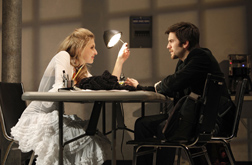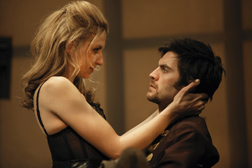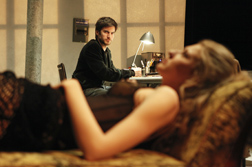By Lucy Komisar
In David Ives’ ingeniously clever play, a feminist avenger turns the tables on a playwright conducting auditions for a work based on Venus in Furs, a novel of sexual domination and submission by Leopold von Sacher-Masoch, the 19th-century Austrian writer.
Sacher-Masoch had fantasies about dominant women wearing fur. He signed a contract with one mistress making him her slave for six months; she would have to wear furs whenever possible. He divorced his wife, who did not like the games, and she wrote a tell-all memoir under the pseudonym of Wanda von Sacher-Masoch.
In Ives’ inspired invention at the Classic Stage, which might for the first time be putting on a work referencing classic porn, a fellow who seems to think of himself as a Sacher-Masoch meets a woman who goes Wanda one better. And the audience is a clear winner.

An actress curiously named Vanda Jordan (Nina Arianda) arrives in a rush at the studio rented by young playwright Thomas Novachek (Wes Bentley). She’s wearing a black leather skirt and a tight black lacey underwear top, stiletto-heeled boots, and a silver-studded dog-collar. Her conversation is ditzy. She’s late, the auditions are over, and she’s not on the list. But she persuades Thomas to let her read, and suddenly she is Vanda von Dunayev, charming, articulate, and outrageous in the white flouncy dress she pulls over her grunge-wear.
In this steamy play-within-a-play, it is 1870, and we are learning about the pleasures of degradation. Thomas line-reads Severin von Kushemski. When he is 12, Kushemski’s aunt beats him with switch. It teaches him that there can be nothing more sensuous than pain or more pleasurable than degradation. The Countess had become my ideal… Since then, he seeks a woman of her delicious cruelty.
Vanda, playing the woman to whom he’s transferred his kinky desires, warns him, I‘d be careful if I were you. When you obtain your ideal, she maybe crueler than you care for.
As the play in a play goes on, the truth about Wanda collides with the truth about Vanda. And the truth about Thomas is exposed. In fact, it’s Thomas’s fantasy that is at the heart of the reality of this play that plumbs men’s psychological connections between sex and power and their view of women. And it’s Vanda’s assertiveness that issues the feminist challenge to their notions.

Her character, Dunayev, declares, In our society, a woman’s only power is through men. Her character is her lack of character. She’s a blank, to be filled in by creatures who at heart despise her. I want to see what Woman will be when she ceases to be men‘s slave. When she has the same rights as he, when she’s his equal in education and his partner in work. When she becomes herself. An individual. Vanda comments that she is really ahead of her time, isn’t she.
Women‘s rights, yadda yadda, remarks Thomas. His fiancée, who he chats with on the phone, seems assertive enough, presently studying for a doctorate. Is there an undercurrent of male resentment here?
There turns out to be a back story to the play and the audition. Thomas starts getting suspicious that Vanda seems to know the script by heart, though she says she just thumbed through it on the subway. And she appends a running commentary about the text, switching between herself and the character as the play goes on.
Kushemski declaims that he wants to be dominated by Dunayev, to be less than nothing, to have no will of my own. To be your property and vanish in your sublime essence. And he explains, In love as in politics, one partner must rule. One of them must be the hammer, the other the anvil. I willingly accept being the anvil.
Vanda declares, This ain‘t about love. It‘s about getting a piece of me.

Then suddenly there’s a switch. Dunayev says, I could imagine giving myself to one man for life, if he commanded my respect. If he overpowered me with his strength. Overwhelmed me with the force of his being. If he enslaved me. I’m going to tell you a secret, Severin. I would submit to a man like that – and I would be faithful, too. I’d kneel to him and bend my neck to him and be his slave.
He’s an oddity. She’s a commodity, Vanda comments. Like all women in eighteen-seventy-whatever.
Kushemski shows his true feelings about the cruelty of women. When Dunayev admits, Severin, don’t you see? Don’t you understand you’ll never be safe in the hands of a woman? Of any woman? Vanda declares, Now this part is so sexist it makes me like scream. She says, ‘You’ve corrupted me…..’ This is like some old Victorian Teutonic tract against Das Female. He forces her into a power play and then he blames her.
Thomas is furious, How can you be so good at playing her, and be so fucking stupid about her? You fucking idiot! You fucking idiot woman. Yes. Idiot woman. Idiot actress.
Nina Arianda is terrific as she shifts on cue between Wanda and Vanda. She is perfect as the slightly scatterbrained young woman who can’t manage to keep her belongings from slipping out of her hands, uses street language and becomes increasingly indignant about the sexist aspects of the play. Her voice and carriage are equally perfect as the self-assured aristocrat. Wes Bentley is a fine foil as Thomas Novachek, though Arianda is clearly the center of attention. Director Walter Bobbie styles and guides the past-paced fantasy so skillfully that you forget you are in a bare studio with little more than a table and chair.
The conflict escalates on page and on stage. The power and domination paradigms shift several times. I can’t tell more or that would spoil it. Suffice it to say that Ives writes a startling and satisfying feminist end to a famous bit of male pornography.
Venus in Fur. Written by David Ives, directed by Walter Bobbie. Classic Stage, 136 East 13th Street, New York, NY. 212-352-3101, 866-811-4111. Opened January 26, 2010, closes March 28, 2010. Revival with Hugh Dancy as Thomas Novacheck at Lyceum Theatre, 149 West 45thStreet, 212-239-6200. 2011-2012 season.
.

